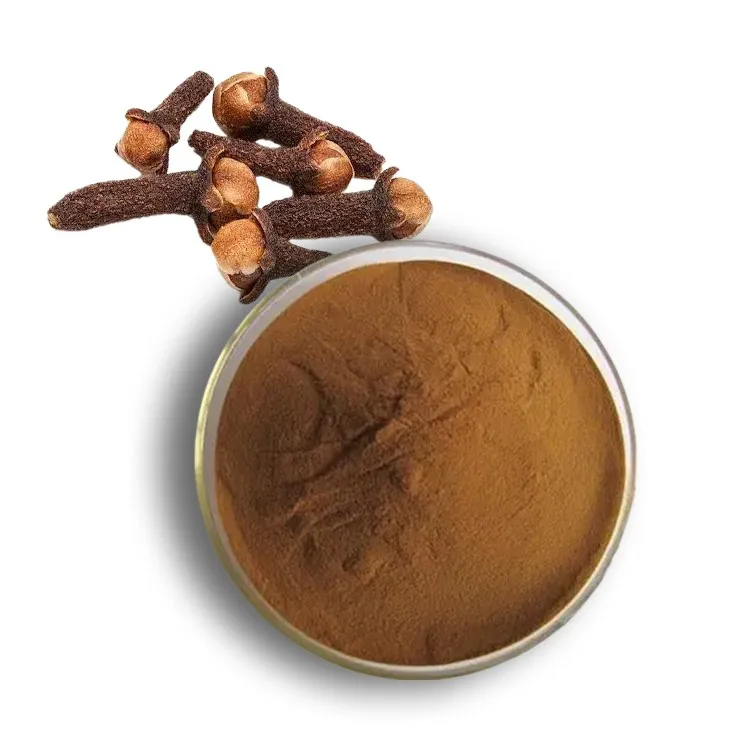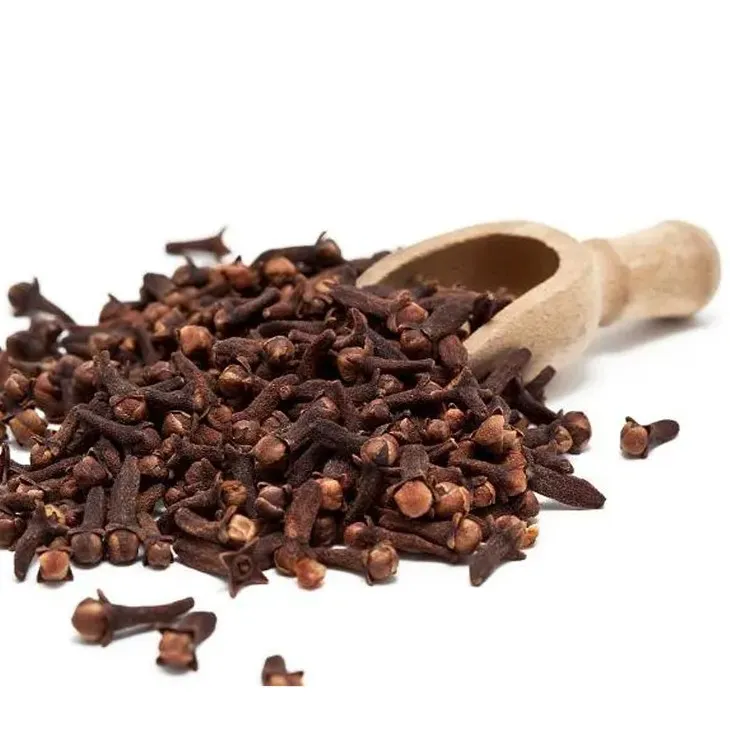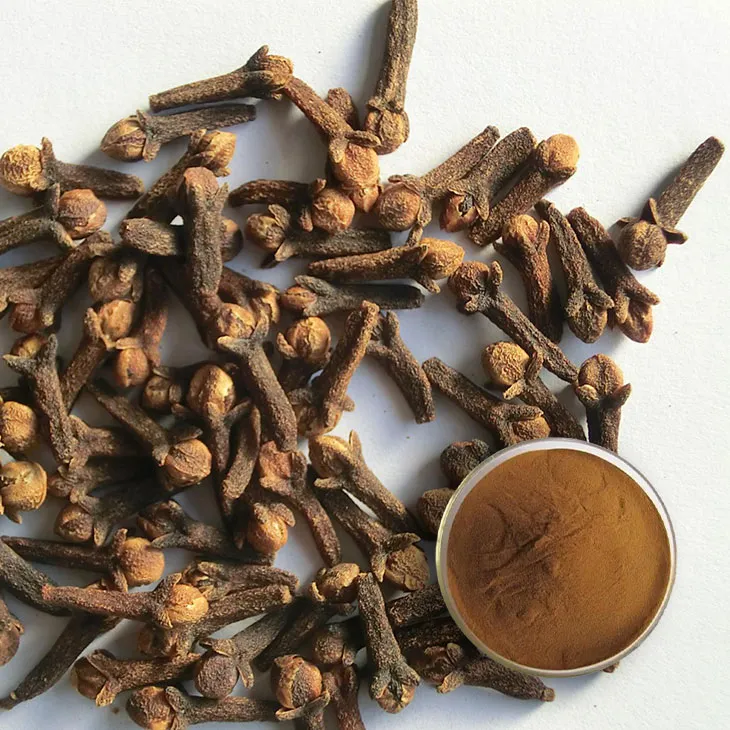- 0086-571-85302990
- sales@greenskybio.com
Use clove powder to prevent diseases and enhance immunity.
2024-11-12

1. Introduction
Clove Powder, derived from the dried flower buds of the clove tree (Syzygium aromaticum), has been used for centuries in various cultures for its potential health - benefits. This article aims to explore how Clove Powder can play a role in preventing diseases and enhancing immunity, by delving into its nutritional components, traditional uses, and modern research findings.

2. Nutritional Components of Clove Powder
Clove powder is rich in a variety of bioactive compounds, which contribute to its potential health - promoting properties:
2.1 Eugenol
Eugenol is the main active ingredient in clove powder. It has antibacterial, antifungal, and anti - inflammatory properties. Studies have shown that eugenol can inhibit the growth of various harmful microorganisms, such as Staphylococcus aureus and Candida albicans. This antibacterial and antifungal activity may help prevent infections and thus contribute to overall disease prevention.
2.2 Flavonoids
Clove powder contains flavonoids, which are known for their antioxidant effects. Antioxidants play a crucial role in protecting the body from oxidative stress. Oxidative stress can damage cells and DNA, leading to various diseases, including cancer and heart disease. The flavonoids in clove powder can scavenge free radicals, reducing the risk of oxidative - related diseases and potentially enhancing the immune system.
2.3 Minerals
Clove powder also contains essential minerals such as potassium, calcium, and magnesium. Potassium is important for maintaining proper heart function and fluid balance in the body. Calcium is necessary for strong bones and teeth, and also plays a role in muscle function and nerve transmission. Magnesium is involved in over 300 enzymatic reactions in the body, including those related to energy production and immune function.

3. Traditional Uses of Clove Powder
Clove powder has a long history of traditional use in different parts of the world:
3.1 In Ayurvedic Medicine
In Ayurveda, the traditional medicine system of India, clove powder has been used for various purposes. It has been used to treat digestive problems, such as indigestion, flatulence, and nausea. Clove powder was often combined with other herbs to enhance its digestive - stimulating effects. Additionally, it was used in oral health, for example, to relieve toothache and bad breath. Ayurvedic practitioners believed that clove powder could help balance the body's doshas (vata, pitta, and kapha) and promote overall well - being.
3.2 In Traditional Chinese Medicine
In Traditional Chinese Medicine (TCM), clove has been used as a warming herb. It was used to treat "cold" syndromes, such as cold hands and feet, and poor circulation. Clove was also considered beneficial for the spleen and stomach, helping to improve digestion. TCM often used clove in the form of decoctions or combined it with other herbs in herbal formulas.
3.3 In Middle Eastern and North African Traditional Medicine
In the Middle East and North Africa, clove powder has been used for centuries in cooking and as a medicinal herb. It was used to treat respiratory problems, such as coughs and colds. Clove - infused teas or inhalations were used to relieve congestion and soothe the respiratory tract. It was also used topically to treat skin infections and wounds due to its antibacterial properties.

4. Modern Research Findings on Clove Powder
Modern scientific research has provided more evidence on the potential health benefits of clove powder:
4.1 Immune - enhancing Effects
Studies have suggested that the bioactive compounds in clove powder can stimulate the immune system. For example, eugenol has been shown to enhance the activity of immune cells such as macrophages. Macrophages are important immune cells that play a role in engulfing and destroying foreign pathogens. By enhancing macrophage activity, clove powder may help the body better defend against infections. Additionally, the antioxidant properties of clove powder may also contribute to immune enhancement by protecting immune cells from oxidative damage.
4.2 Anti - cancer Potential
Some research has indicated that clove powder may have anti - cancer properties. The flavonoids and other bioactive compounds in clove powder may be able to inhibit the growth of cancer cells. In vitro studies have shown that certain components of clove powder can induce apoptosis (programmed cell death) in cancer cells. However, more in - vivo studies and clinical trials are needed to confirm its potential as an anti - cancer agent.
4.3 Cardiovascular Health
Clove powder may also have beneficial effects on cardiovascular health. The potassium in clove powder can help regulate blood pressure. Additionally, the anti - inflammatory properties of eugenol may reduce inflammation in blood vessels, which is associated with a lower risk of heart disease. Some studies have also suggested that clove powder may help lower cholesterol levels, although more research is required to fully understand this effect.
5. How to Incorporate Clove Powder into Your Diet
Clove powder can be easily incorporated into your daily diet in various ways:
-
Spices in Cooking: Add a pinch of clove powder to your favorite dishes, such as curries, stews, or baked goods. It can add a warm, spicy flavor to your meals while also providing potential health benefits.
-
Herbal Teas: Make a clove - infused tea by steeping a teaspoon of clove powder in hot water for 5 - 10 minutes. You can add honey or lemon for taste. Drinking clove tea regularly may help with digestion, soothe the throat, and potentially boost immunity.
-
Smoothies: Incorporate a small amount of clove powder into your smoothies. This can be a great way to add its health - promoting properties to your daily nutrition routine, especially if you are looking for a more natural way to enhance your immunity.
6. Precautions and Considerations
While clove powder has many potential health benefits, there are also some precautions to keep in mind:
6.1 Allergic Reactions
Some people may be allergic to clove powder. Allergic reactions can range from mild skin rashes to more severe symptoms such as difficulty breathing. If you experience any adverse reactions after consuming clove powder, stop using it immediately and seek medical attention.
6.2 Dosage
Although clove powder is generally considered safe when used in moderation, excessive consumption may cause side effects. High doses of eugenol, for example, may be toxic. It is important to follow recommended dosages, especially if you are using clove powder for medicinal purposes.
6.3 Interaction with Medications
Clove powder may interact with certain medications. For example, it may affect blood - thinning medications due to its potential anti - platelet activity. If you are taking any medications, it is advisable to consult your doctor before using clove powder regularly.
7. Conclusion
Clove powder is a natural substance with a rich history of traditional use and promising modern research findings. Its nutritional components, including eugenol, flavonoids, and minerals, contribute to its potential in preventing diseases and enhancing immunity. However, it is important to use it with caution, taking into account potential allergic reactions, proper dosage, and possible interactions with medications. By incorporating clove powder into your diet in a safe and appropriate way, you may be able to take advantage of its potential health - promoting properties.
FAQ:
Question 1: What are the main nutritional components in clove powder?
Clove powder contains various beneficial components. It has essential oils, which are rich in eugenol. It also contains flavonoids, phenolic compounds, and some minerals. These components contribute to its potential health - promoting properties.
Question 2: How has clove powder been traditionally used for health?
Traditionally, clove powder has been used in different ways for health. It has been used to relieve toothache as it has numbing and antibacterial properties. In some traditional medicine systems, it was used to aid digestion, as it was believed to stimulate the production of digestive enzymes. It was also used to treat respiratory problems like coughs and colds, often in the form of herbal teas or inhalations.
Question 3: What do modern research findings say about clove powder's role in disease prevention?
Modern research has shown that clove powder may have several roles in disease prevention. Some studies suggest that its antibacterial and antifungal properties can help prevent infections. The antioxidant properties of its components, such as eugenol, may play a role in preventing oxidative stress - related diseases. There is also evidence that it may have anti - inflammatory effects, which could be beneficial in preventing chronic inflammatory diseases.
Question 4: How does clove powder enhance immunity?
Clove powder may enhance immunity through multiple mechanisms. Its antioxidant properties can help protect immune cells from damage by free radicals. The antibacterial and antifungal effects can prevent infections that might otherwise suppress the immune system. Additionally, some of its compounds may stimulate the production of certain immune cells or enhance the function of the immune system.
Question 5: Are there any side effects of using clove powder?
While clove powder has many potential benefits, there can be side effects. In some cases, it may cause allergic reactions in sensitive individuals. Excessive use may also lead to irritation of the digestive system, such as stomach upset or nausea. Pregnant women should be cautious as high doses may pose risks to the fetus.
Related literature
- The Medicinal Properties of Clove: A Review"
- "Clove Powder: Nutritional and Therapeutic Potential"
- "Modern Research on Clove in Health and Disease Prevention"
- ▶ Hesperidin
- ▶ citrus bioflavonoids
- ▶ plant extract
- ▶ lycopene
- ▶ Diosmin
- ▶ Grape seed extract
- ▶ Sea buckthorn Juice Powder
- ▶ Beetroot powder
- ▶ Hops Extract
- ▶ Artichoke Extract
- ▶ Reishi mushroom extract
- ▶ Astaxanthin
- ▶ Green Tea Extract
- ▶ Curcumin Extract
- ▶ Horse Chestnut Extract
- ▶ Other Problems
- ▶ Boswellia Serrata Extract
- ▶ Resveratrol Extract
- ▶ Marigold Extract
- ▶ Grape Leaf Extract
- ▶ blog3
-
Cranberry Plants and Skin - care Products.
2024-11-12
-
Kidney Bean Extract
2024-11-12
-
Phellodendron Extract
2024-11-12
-
Oyster Mushroom Extract Powder
2024-11-12
-
Diosmin
2024-11-12
-
Pine bark Extract Powder
2024-11-12
-
Nettle Root Extract
2024-11-12
-
Buckthorn bark extract
2024-11-12
-
Natural grape seed extract
2024-11-12
-
Giant Knotweed Extract
2024-11-12
-
Pueraria Lobata Extract
2024-11-12





















